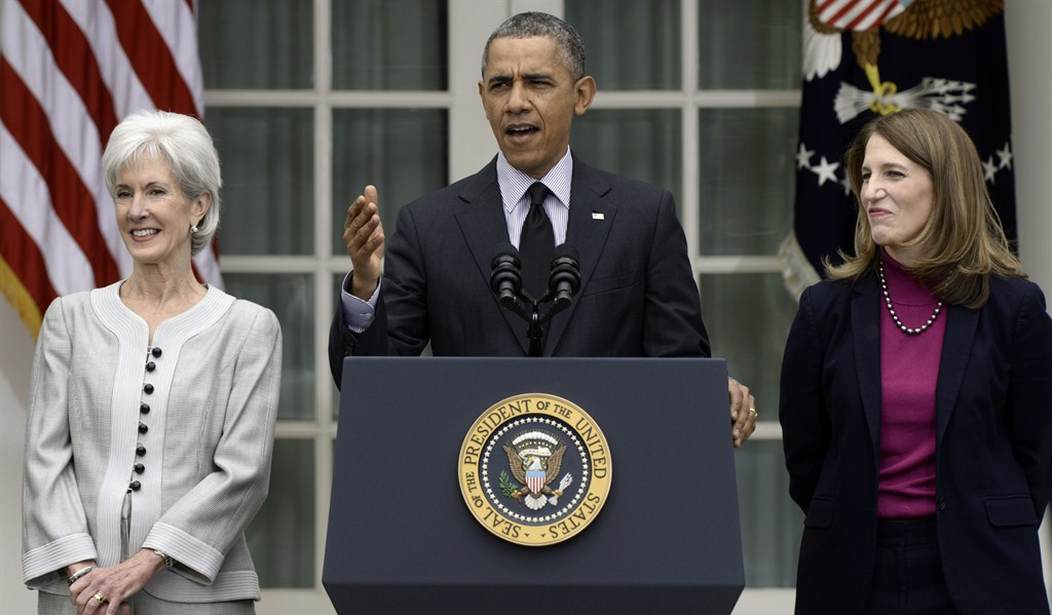Who's up for the latest batch of bad Obamacare-related news?
(1) Consumers brace for the second full year of Obamacare implementation, as the average individual market premium hike clocks in at eight percent -- with some rates spiking by as much as 30 percent.
(2) "Wide swings in prices," with some experiencing "double digit increases."(Remember what we were promised):
Insurance executives and managers of the online marketplaces are already girding for the coming open enrollment period, saying they fear it could be even more difficult than the last. One challenge facing consumers will be wide swings in prices. Some insurers are seeking double-digit price increases…
(3) A nightmarish tax season, via Philip Klein:
The top executive for H&R Block, the nation’s largest tax preparer, on Wednesday said he expected President Obama’s health care law to add “significant complexity” to next year’s tax season...“As expected, the forms are very detailed and can present significant complexity, depending on a filer’s coverage status during the year, income level, and household composition,” Cobb said. “Depending on their situation, there are instances where filers may need to file multiple new tax forms and complete additional worksheets.” Starting with next year’s tax season, individuals who do not have health insurance that meets federal requirements will be subject to penalties. But there are various categories of individuals who could be exempted. “Depending on the type of exemption, the process to claim it could be quite cumbersome and time consuming,” Cobb said.
(4) Rural hospitals closing down:
Small, rural hospitals like Linden have always struggled to remain viable, but things are getting worse, fast. Rural communities are shrinking at a time when healthcare providers are being pressured to cut costs and release patients sooner. Twenty-four rural hospitals have closed across the country since the start of 2013, double the pace of the previous 20 months, according to the North Carolina Rural Health Research Program….Now the Affordable Care Act, better known as Obamacare, is bringing additional pressure. Obamacare is designed to fold the poor and uninsured into the healthcare system, but changes in how the federal government pays for the disadvantaged are already pressuring the hospitals that cater to them, such as rural ones.
Recommended
(5) Thanks, taxpayers. Please enjoy the unironic use of "unlikely:"
With an $8 billion tax on insurers due Sept. 30 — the first time the new tax is being collected — the industry is getting help from an unlikely source: taxpayers. States and the federal government will spend at least $700 million this year to pay the tax for their Medicaid health plans. The three dozen states that use Medicaid managed care plans will give those insurers more money to cover the new expense. Many of those states – such as Florida, Louisiana and Tennessee – did not expand Medicaid as the law allows, and in the process turned down billions in new federal dollars. Other insurers are getting some help paying the tax as well. Private insurers are passing the tax onto policyholders in the form of higher premiums. Medicare health plans are getting the tax covered by the federal government via higher reimbursement.
(6) One of Obamacare's chief architects is proudly predicting that 80 percent of employer-based healthcare plans will disappear within the next decade. Administration officials offered similar projections in private, even as Democrats repeatedly promised that Americans could keep their existing coverage, with which the vast majority were satisfied:
(7) The federal health spending "cost curve" continues to point up, not down (as promised), as health spending increases, via the government's own actuaries:
The combined effects of the Affordable Care Act’s coverage expansions, faster economic growth, and population aging are expected to fuel health spending growth this year and thereafter (5.6 percent in 2014 and 6.0 percent per year for 2015–23)...Because health spending is projected to grow 1.1 percentage points faster than the average economic growth during 2013–23, the health share of the gross domestic product is expected to rise from 17.2 percent in 2012 to 19.3 percent in 2023.
(8) Hampering the economy:
Last month, the Federal Reserve Bank of New York published two surveys of regional employers—one focused on manufacturing businesses, one on service companies—and asked them how Obamacare was affecting their businesses. For 2015, 33.3 percent of service firms said Obamacare was increasing their costs “a lot,” whereas 51.2 percent of manufacturing firms said the same. While almost no firms said they would be dropping health coverage for their workers, 16.9 percent of service firms and 21.6 percent of manufacturers said they would be reducing their workforce due to Obamacare. 21.8 and 20.5 percent, respectively, said they would be reducing wage and salary compensation. 25 and 36.4 percent, respectively, said they would be raising prices for their customers.
Avik Roy spells out the three primary ways in which the "Affordable" Care Act acts as a wet blanket on the US job market: (a) Obamacare is one of the largest tax increases in U.S. history; (b) Obamacare increases the cost of employing workers; (c) Obamacare’s exchange subsidies encourage many workers to drop out. Click through for details. In fact, the nonpartisan CBO released new numbers this week that underscore our halting economic progress:
CBO: the shortfall in labor force participation & elevated unemployment rate have resulted in substantially lower employment in 2014
— S2 (@StewSays) September 2, 2014
























Join the conversation as a VIP Member